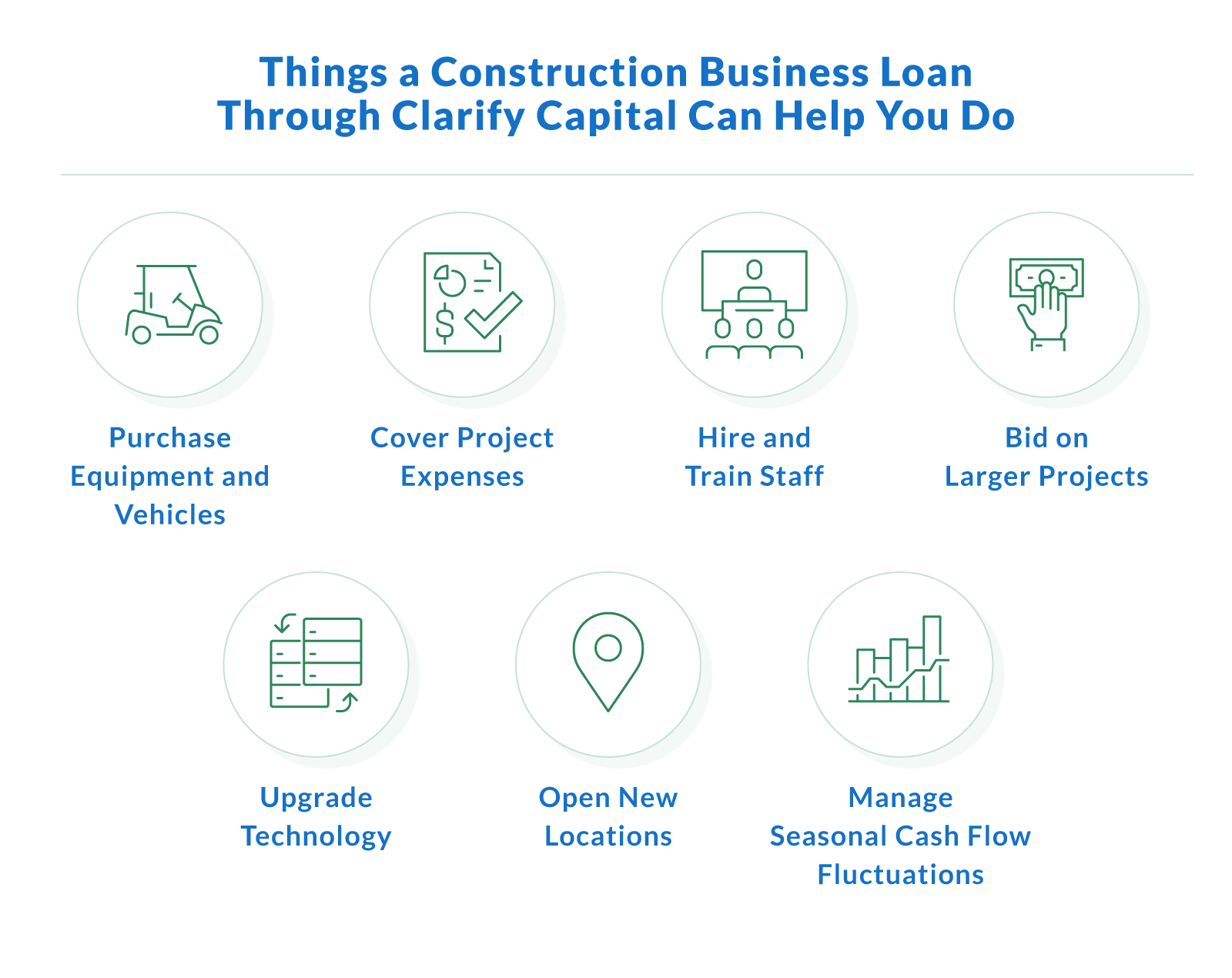Running a construction business is capital-intensive. You need to maintain equipment, pay your crew, and market your services — all while keeping cash flow steady.
That's where Clarify steps in. We help construction companies stay funded with quick approvals, competitive rates, and working capital designed for your needs.
There are multiple types of business financing solutions available, but understanding how construction loans work can help you choose the best fit for your business needs. Here are the types of loans that work best for small business owners in the construction industry.
This guide breaks down the best loan options for construction companies, including SBA loans, equipment financing, and working capital solutions, and shows how to qualify quickly.
Short-Term Construction Loans for Contractors
Short-term loans are a traditional financing option with no collateral for contractors. A lender provides a fixed lump sum with a specified interest rate that you pay back to the lender based on set repayment terms.
The main advantages of short-term loans for your construction business are:
Fast access to funds. Get the capital you need in as little as one to two days to seize urgent business opportunities.
No collateral needed. Protect your assets while securing financing that supports your growth.
Credit-flexible approvals. Whether your score is strong or still improving, you may still qualify for funding.
Business Lines of Credit for Construction Businesses
Think of a business line of credit as being similar to how credit cards work (with lower interest rates than credit cards). You are approved for a credit limit by a lender with a specified APR. You only pay interest on the amounts of funds you withdraw from your total credit line, just like a credit card.
A business credit card can be a useful complement to a business line of credit, offering flexible spending for smaller purchases, while a line of credit provides working capital for larger expenses.
Here are the key benefits of a business line of credit:
Only pay for what you use. Interest applies only to withdrawn funds, helping you control costs and preserve cash flow.
Get funding on demand. Your credit line is always available when business needs arise — no need to reapply.
Boost your credit profile. Responsible use can strengthen your credit history and unlock better financing in the future.
Save with early repayment. Pay off your balance anytime with no penalties, reducing total interest costs.
Equipment Loans for Construction Companies
Equipment is the lifeline for all construction business owners. Contractors are always buying or repairing existing machinery and tools. With equipment financing, the lender gives you 100% of the loan amount to purchase your equipment. The equipment serves as the collateral needed for the loan. The structure is very similar to getting an auto loan with monthly payments.
The benefits of equipment financing include:
Flexible credit options. Since the equipment serves as collateral, even business owners with less-than-perfect credit can qualify.
Streamlined application process. Minimal paperwork means you can secure funding quickly without jumping through hoops.
Competitive interest rates. Access low APRs that make it easier to invest in essential equipment without straining your budget.
Understanding Equipment Ownership and Financing Models
Construction companies can use equipment financing to purchase, lease, or upgrade machinery, not just brand-new items. Many lenders offer 100% financing on both new and used equipment, depending on creditworthiness. This allows you to secure assets like excavators, skid steers, and trucks without needing a large upfront investment. Equipment loans are typically structured with fixed monthly payments and may include end-of-term buyout options for leased items. Owning your equipment can increase long-term profitability by reducing subcontractor costs and giving you more project control.
SBA 7(a) and Microloans for Construction Companies
As the holy grail of small business loans, SBA loans are partly backed by the federal government. While interest rates for SBA loans are low, the process of getting one is lengthy and full of paperwork. Your credit score also needs to be in good shape to get approved. We help construction business owners secure SBA loans if their capital needs are further out into the future.
Unlike short-term loans, SBA loans offer longer-term repayment options, allowing borrowers to spread costs over five to 25 years, making them an ideal choice for larger construction projects.
SBA loans come with several key benefits that make them an attractive option for small business owners:
Backed by the SBA. SBA loans are partially secured by the U.S. Small Business Administration, offering added security for lenders.
Competitive interest rates. They typically provide lower interest rates compared to other financing options.
Flexible use of funds. SBA loan funds can be used for various working capital needs, giving business owners versatility.
Extended repayment terms. They often come with longer repayment periods, allowing more time to manage payments effectively.
Invoice Financing and Factoring for Construction Companies
Contractors are used to having multiple outstanding invoices that are in the process of getting paid. If that's the case for you, invoice factoring lets you get up to 100% of the invoice value from a lender. Factoring is primarily for business-to-business (B2B) companies. So, if your services are geared towards consumers, opt for a short-term loan or business line of credit instead.
Invoice factoring offers several benefits for business owners looking to manage cash flow effectively:
Get capital fast. Get quick funding without waiting for customers to pay outstanding invoices.
No personal guarantee required. Your invoices are your loan collateral, so you don't need to risk personal assets.
Approval based on your customers. Lenders focus on your customer's creditworthiness, making it easier to qualify.
Merchant Cash Advance for Construction Companies
A merchant cash advance (MCA) is an alternative financing option ideal for construction companies with consistent sales but unpredictable cash flow. Unlike traditional loans, MCAs provide you with an upfront sum of cash in exchange for a percentage of your future credit card sales or daily bank deposits. This arrangement allows you to repay as your business earns, offering a flexible solution for contractors.
Here are the key benefits of merchant cash advances:
Fast and flexible funding. MCAs can be approved and funded in as little as 24 hours, helping you cover urgent business needs quickly.
No fixed repayment schedule. Payments are tied to your revenue, so you pay more during busy periods and less during slower months.
No collateral is required. Since repayment is based on sales, there's no need to put up business or personal assets as collateral.
Accessible with poor credit. Approval is primarily based on cash flow and sales history, making it a viable option even if your credit score isn't perfect.
Merchant cash advances can be a powerful tool to handle short-term financial challenges or take advantage of immediate opportunities in the construction industry.



